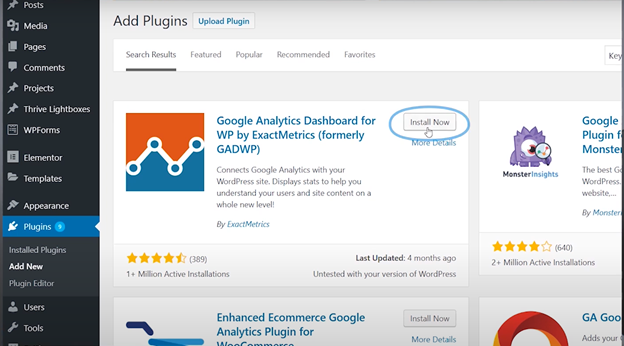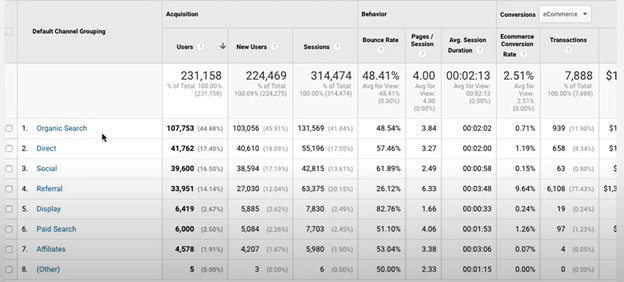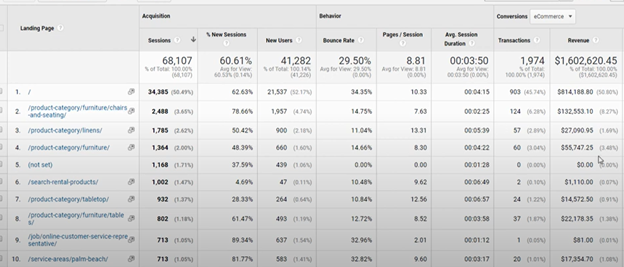Google Analytics is a must-have tool for anyone interested in growing their website.
If you don’t want to install code on your website, and like 25% of the world you use WordPress, this simple WordPress plugin will allow you to track and understand your site visitors’ and customers’ behaviors. You can see what they’re looking for and assess whether you’re addressing their needs.
Simply put, Google Analytics is the go-to tool for anyone looking to dissect and study their website to better meet the audience’s needs.
Read on to find 7 reasons why you should include Google Analytics in your online marketing campaign:
1. Understand How Users Find Your Site
Google has an entire “Acquisition” section which lets you know how each of your site visitors found your web pages.
Let’s say you have a website whose primary goal is to promote a service or sell a product. Assuming you run your ads through Google Search, YouTube, Instagram, and Facebook.
Once you install Google Analytics, you’ll get a unique code to add to your website URL. That code will track where your visitors are coming from. Such that you’ll see which ad or platform is giving you the most or least amount of traffic.
2. See What Visitors Are Doing
Getting people to your website is a huge achievement. But ensuring they stick around and come back is also equally important.
Google Analytics will offer insights on the pages that people come to first on your site, your landing pages. You’ll see the pages they click, and how long they stay on your website.
You’ll also see the number of people who are bouncing off your website and where they are bouncing off. It could be the homepage, a specific landing page, or right before the checkout section.
Allowing you to understand what you need to improve or change on your site. So that you can provide a seamless transition on the various stages of your sales funnel and drive more people to follow your call to action.
3. Segment Your Audience
There’s a specific type of website visitor that’s most valuable to your business.
Google Analytics allows you to see statistics about people who view your pages and help you build your customer avatar. You’ll know the searcher’s ages, gender, location, and general interests online. That way, you can target the largest demographic and hopefully grow your website.
- Age: Knowing your audience’s average age can help you understand how they spend most of the time. With this, you can optimize your website accordingly.
- Gender: This variable will help you describe your audience. Gender plays a significant role in how people communicate and engage online.
- Interests: Google Analytics will help you understand your audience’s interests. You can then customize your website in line with their interests.
- Device: With Google Analytics, you can also see what kind of tablet or smartphone your audience uses. If your website gives a different experience on one browser or device than the others, you may be losing visitors. Understanding how people visit your site will be essential in your efforts to optimize for your target audience.
- Location: The Geolocation feature will let you know the country and city that your audience comes from and the language they use. You can, therefore, provide multiple versions of your site in different languages if you have more international customers.
4. Know Your Best Content
Google Analytics will show you which content on your website gets the most visits. You’ll see the average visit duration, and bounce rates for individual pages. With this information, you can analyze individual pages and optimize for better engagement.
Optimization could be in the form of adding purchase links or call to action buttons on the pages to boost conversions.
You can also revamp the entire website design, structure or update your top landing pages with the latest information. Making your site look more modern and relevant.
Google Analytics will also help you learn the content type that works best and the ones that don’t. You can then focus on creating content that gets you more visits to boost engagement on your web pages.
5. Improves SEO Performance
Search Engine Optimization (SEO) plays a significant role in determining business growth. The more organic traffic your website gets, the more leads and conversions it gains.
Analytics will power your SEO in several ways. By understanding the interests and demographics of your visitors, you can create targeted content. That way, you’ll gain more visibility on Google.
Secondly, Google Analytics will track your referrals and give you some insights on backlinks. You can connect the analytics account with Google Search Console to track the search queries that send you most of the traffic. This will give you data on the total number of clicks, impressions, click-through-rate, and average position.
You can also track what visitors are searching for on your website. All you have to do is set up site search tracking. Using this option, you’ll be able to compare your content, with what your users are looking for. Which lets you know whether you are meeting your potential customers’ expectations or not. If you have a blog, this will also provide keywords to target.
6. Spy on Your Competitors
With Google Analytics, you can understand how your competitors get users to visit their sites.
GA’s Network reports give clues as to where they get users from and analyze traffic movements. Providing you with more context around every viewed page, time on page, bounce rates, and the number of individual sessions.
You can simply compare traffic stats with your competitor to see the number of visitors your competitor has over a period of time. And once you compare the data with yours, you’ll have an easy way of knowing where your website comes out on top and whether you need to change your strategy.
Looking at Google Analytics’ engagement reports, you can see how long your competitors were on your site. Just in case they were also spying on you.
7. Create and Track Campaigns
Your goal is to get more customers. But if you can’t measure the effectiveness of your marketing campaigns, you can’t improve it.
For example, if you’ve created an email campaign targeting a customer segment. You’ll need to track those that bring clients to your site. Allowing you to shape the content of your emails so that it gets more leads.
Google Analytics will help you measure the impact (and success) of such a campaign.
About The Author
Marketing Team
The AOK Marketing Team is a diverse group of amazing individuals driven to help all of our clients succeed. Great people are everywhere, and we believe that people should control their workday, their work environment, and where they live. We have team members in 9 countries: United States, Canada, Egypt, Belgium, Ireland, Australia, India, Pakistan, and Hong Kong.
How can we help you?







